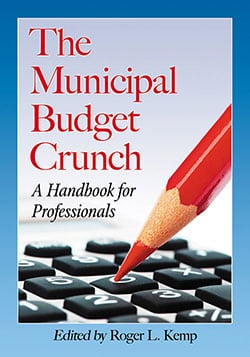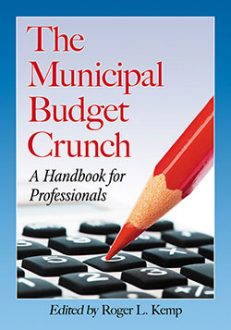Subtotal: $23.99
The Municipal Budget Crunch
A Handbook for Professionals
$39.95
In stock
About the Book
This book is based on a national literature search focusing on the best practices of cities, of all sizes and geographic locations, intended to maintain public services while holding down taxes. Many public officials have great ideas, but tend to work in a vacuum, so they don’t know what other cities are doing. This volume codifies knowledge in this new field for the first time. Every case study included in this book has the city’s website listed. This reference work makes it easy for professionals seeking additional information on any and all budget reduction methods that seem to work somewhere.
About the Author(s)
Bibliographic Details
Edited by Roger L. Kemp
Format: softcover (7 x 10)
Pages: 277
Bibliographic Info: appendices, index
Copyright Date: 2012
pISBN: 978-0-7864-6374-9
eISBN: 978-0-7864-9235-0
Imprint: McFarland
Table of Contents
Acknowledgments viii
Preface 1
Part I. Introduction
1. The Fiscal Crisis and America’s Cities
Derek Okubo 7
2. Balancing Budgets with Job and Service Reductions
Christopher W. Hoene and Jacqueline J. Byers 13
3. Prudent Options for Balancing City Budgets
Roger L. Kemp 17
4. Saving Money by Contracting for Public Services
Amanda M. Girth and Jocelyn M. Johnston 22
5. Innovative Staffing Options Help Balance Budgets
Laura Kushner 25
6. Evaluating the Results of Staffing Decisions Beforehand
Lisa Rund and <I?Laura Kushner 28
7. Options to Ensure Fiscal Health During Tough Times
Alan Kemp 32
8. Strategies to Ensure Long-Term Fiscal Health
Jeff Schott 35
9. Financial Measures to Restore America’s Infrastructure
Nancy Mann Jackson 38
Part II. Best Practices
10. Ann Arbor Uses Economic Development to Increase Its Revenues
Craig Chavez 41
11. Arlington and Other Cities Share Services to Reduce Costs
Monte Mercer 44
12. Auburn and Adjoining City Consolidate Services
Liz Chapman Mockler 49
13. Boca Raton Develops Long-Range Financial Plans
Linda C. Davidson 53
14. Chandler and Other Cities Use Volunteers to Provide Services
David Bigos 57
15. Charlotte and Other Cities Implement Employee Wellness Programs
Robert Barkin 65
16. Chicago Uses Citizen Input to Make Budget Decisions
Josh Lerner 68
17. Cincinnati and Other Cities Improve Public Trust in Government
Sheryl Sculley 74
18. Colorado Springs Uses Citizens to Evaluate Public Services
Zach Patton 76
19. Coral Springs and Other Cities Focus on Financial Planning
Shayne Kavanagh 81
20. Denver and Other Cities Use Performance Results to Make Budget Decisions
Melanie McKinney-Gonzales 86
21. Des Moines and Other Cities Seek Citizen Input on Public Services
Barbara J. Cohn Berman 89
22. Elgin and Other Cities Use Public Managers to Address Fiscal Issues
Elizabeth Kellar 96
23. Eugene Uses Citizens to Improve Its Budget Process
Donald J. Borut, Melissa Germanese and William Barnes 102
24. Gardena’s Public Manager Improves City Finances
Lynn Peisner 108
25. Hanover and Other Cities Implement Generic Service Reductions
Joe Casey and Shayne Kavanagh 112
26. Harrisburg and Other Cities Revise Their Property Tax Structure
Walter Rybeck 117
27. Las Vegas and Other Cities Reassess Their Basic Services
Karen Thoreson and James H. Svara 120
28. Lewiston and Other Cities Consider Property Tax Relief for Senior Citizens
Douglas Rooks 127
29. New York Provides Special Services to Low-Income Citizens
Gordon Berlin and James Riccio 131
30. Peoria Uses Performance Measures to Improve Its Budget Process
Peter Christensen and Katie Gregory 136
31. Philadelphia and Other Cities Reconsider Their Contract Services
Russell Nichols 139
32. Portland Uses a New Financial Management Assessment Process
Michael Bailey, Karen Feher and Shayne Kavanagh 142
33. Provo Uses Employees and Citizens to Balance Its Budget
John Borget 146
34. Redlands Uses Citizens to Provide Public Services
John Buntin 149
35. Roanoke Encourages Citizens to Provide Tax Relief
Ann H. Shawver 153
36. Rochester and Other Cities Seek Additional Funding Sources
Kathleen Gray 158
37. Rockland and Other Cities Are Impacted by Senior Citizens
Jeff Clark 160
38. St. Paul and Other Cities Consider Flexible Scheduling to Save Money
Claudia Hoffacker 163
39. San Diego Uses Management and Labor to Solve Budget Problems
Jay M. Goldstone 166
40. San Jose Solicits Feedback on Services from Employees
Brooke A. Myhre 170
41. Sandy Springs and Other Cities Contract for Public Works Services
Robert Barkin 176
42. Savannah Uses a Budgeting for Results Process
Eva Elmer and Christopher Morrill 179
43. Seattle and Other Cities Implement Joint Purchasing Programs
Connie Kuranko 186
44. Springfield and Other Cities Reduce Their Energy Costs
John W. DeWitt 189
45. Walnut Creek and Other Cities Implement New Budget Processes
Shayne Kavanagh, Jon Johnson and Chris Fabian 192
46. Waukesha and Other Cities Reduce Health Costs for Their Aging Employees
Robert Barkin 200
47. West Palm Beach Provides Successful Social Service Programs
Alan Brown 203
48. Westminster Uses Performance Results to Improve Services
Brent McFall 207
49. Worcester Uses an Independent Source to Measure Service Performance
Roberta R. Schaefer 209
Part III. The Future
50. City Revenues, Budgets and the Future
Christopher W. Hoene 215
51. Financial Constraints and New Service Opportunities
William Barnes 219
52. Redefining the Quality of Life in Your Community
Thomas L. Miller and Shannon E. Hayden 221
53. The Condition of America’s Infrastructure
Roger L. Kemp 225
54. Cities, New Technologies and Public Services
Marcel Bullinga 229
55. City Government Options for Public Service Innovations
Christopher Hire 234
56. The Financial Future of America’s Cities
Roger L. Kemp 240
Appendices
A. Local Government Financial Terms 249
B. Regional Resource Directory 253
C. National Resource Directory 254
D. City Management Officials State Chapter Directory 254
E. Finance Officials State Chapter Directory 255
F. State Municipal League Directory 256
G. State Library Directory 257
About the Editors and Contributors 259
Index 261

 Asian Refugees in America
Asian Refugees in America 





